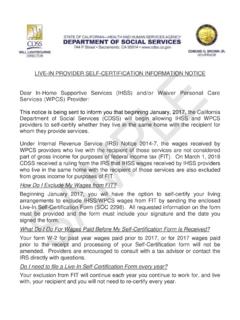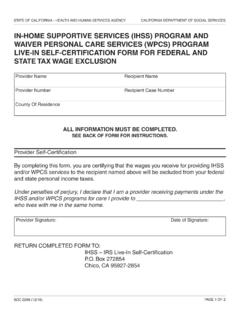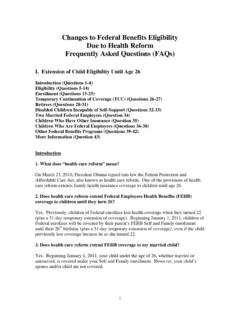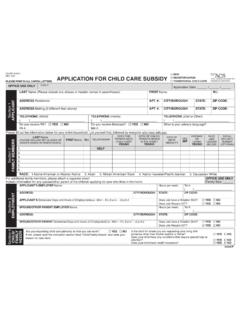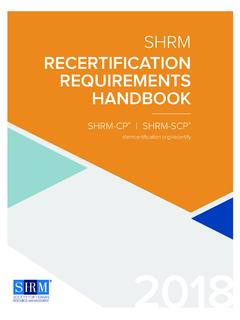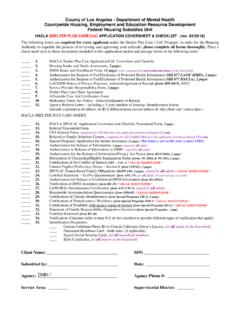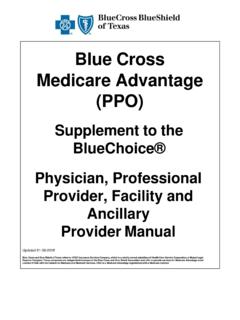Transcription of Being Resilient and Renewing Your Purpose in Healthcare
1 February 2, March 8, April 20, 2018 Jointly provided by the Office of Continuing Medical Education of the Brody School of Medicine of East Carolina University and UNC Eshelman School of Pharmacy and Eastern Area Health Education CenterThe Education Centerat Eastern AHEC2600 W. Arlington , NCBeing Resilient and Renewing Your Purpose in HealthcareHealthcare is a high stress and high intensity profession. The quadruple aim recognizes that the well- Being of those who provide care is inseparable from the health of the system of care and a determinant of health care outcomes. With a focus on individual and team resilience, this program will engage participants in creative approaches to self-care based in the neurobiology of well- Being . Faculty will examine structural challenges that contribute to burnout as well as offer direct experiences with mind-body practices that reduce stress and help build resiliency and joy in any combination of days or all three.
2 DescriptionTarget AudienceObjectivesPlanning CommitteePhysicians, Nurses, Mental Health Professionals, Case Managers, Social Workers, Substance Abuse Professionals, Psychol-ogists, Health Educators, Pharmacists, Dentists, Allied Health Professionals, First Responders, Clergy, Medical Students and anyone who cares for completion of this knowledge based activity, the participant will be able to: Recognize factors that contribute to stress and burnout Develop skills and strategies for self-care Describe the neurobiological and social foundations of resilience Apply skills and strategies for strengthening personal and team resilienceLorrie Basnight, MD, FAAPE xecutive Director, Eastern AHECA ssociate Dean, CME, ECU BSOMR enee Cherry, MSN, RN-BC, CCRN-KProfessional Development CoordinatorVidant Medical CenterKaren Goble, MA Assistant DirectorContinuing Medical, Dental, and Pharmacy EducationECU BSOM/Eastern AHECT onia Joyner, MS, LCASA ssistant DirectorMental Health EducationEastern AHECD onna Moses, MSN, RNDirectorNursing and Allied Health EducationEastern AHECA lice J.
3 Schenall, MPH, MCHES , RHEdAssociate Director, Health Careers & Workforce Diversity/ Dental Education/Public Health/Medical Education Area L AHECB arbara Smith, MS, RDHA ssistant DirectorContinuing Medical, Dental, and Pharmacy EducationECU BSOM/Eastern AHECMary Wilson, PhD, MSN, RNAssistant DirectorNursing and Allied Health EducationEastern AHECL ocationJoin us at The Education Center at Eastern AHEC, which was specifically designed to support education and collaboration in Healthcare and throughout the community. Open spaces and natural light create a modern and restful environment for busy professionals to re-energize and renew their focus. Please bring a sweater or lightweight jacket to ensure your Resilient and Renewing Your Purpose in HealthcareFebruary 2, 2018: Self CareAgenda and Presenters8:00 Registration8:30 Self-Care: Creating YOUR Optimal Healing Environment Christina Bowen, MD Primary Care Physician, Outer Banks Family Medicine, Vidant Medical Group10:00 Break10:15 Self-Care: Creating YOUR Optimal Healing Environment Christina Bowen, MD Primary Care Physician, Outer Banks Family Medicine, Vidant Medical Group11:45 Lunch (provided) Mindful Eating option12:45 Mind-Body Techniques & Resiliency.
4 Recovering the Body s Capacity to Be Well Jon Seskevich, RN, BSN, BA, CHTP Nurse at Duke University Hospital, Certified Stress Management Instructor and healing touch practitioner 2:30 Break2:45 Moral Distress, Burnout and the Moral Distress Education Project Maria Clay, PhD Chair of the Department of Bioethics and Interdisciplinary Studies at East Carolina University 3:45 Summary and Q&A4:00 AdjournObjectivesUpon completion of this knowledge based program, the participant will be able to: Explore a whole person approach to self-care that involves living out of your priorities Discuss key life domains that require attention and intentional cultivation to flourish personally and professionally Create your personal self-care guide and optimal healing environment Demonstrate mind-body skills that help improve re silience and quality of life including physical functioning Explain strategies to help cope with changes in life and recover from stressful events Describe moral distress and the complex systems that contribute to this common source of provider burnout Examine strategies for recognizing and working with moral distress Identify resources including the Moral Distress Education Project that create connection and de-stigmatize the experience of moral distressBeing Resilient and Renewing Your Purpose in
5 HealthcareMarch 8, 2018: In PracticeAgenda and Presenters8:30 Registration9:00 Burnout and Building Resiliency in Practice Theresa Raphael- Grimm, PhD, PMHCNS-BC Professor, Psychiatric and Mental Health UNC Chapel Hill School of Nursing10:15 Break10:30 Burnout and Building Resiliency in Practice Theresa Raphael- Grimm, PhD, PMHCNS-BC Professor, Psychiatric and Mental Health UNC Chapel Hill School of Nursing11:45 Lunch (provided) Mindful Eating option12:45 Resilience Roundtables (choose one; see below)1:45 Break1:55 Resilience Roundtables Repeated (choose one)2:55 Transition3:00 Discovering Joy John Inzerillo, MD Medical Director of Oncology, Marion L.
6 Shepard Center 4:15 Q&A4:30 AdjournUpon completion of this knowledge based program, the participant will be able to: Identify factors that contribute to stress and burnout Describe the psychosocial-biological foundations of resilience Recognize the role of managers and leaders in fostering resilience in the workplace Experience yoga practices for self-care Explain the role of yoga in resilience, self-care and stress management Describe how expressive writing can be a useful self-care tool for maintaining and building resilience Describe how music therapy can be utilized as a mechanism to reduce stress Explain how music therapy can improve bonding within a team Identify spiritual practices that are not specifically religious Support spiritual practices that foster resilience Explore mind/body approaches to taking care of yourself that can be used during the daily practice of Healthcare Discuss strategies for awakening joy in your practice of medicine and in life Participate in a guided meditation that will help you experience greater clarity, intention and compassionObjectivesYoga Samantha Harrison, BS, E-RYT 200,RYT 500 Studio Manager, YogiVibes Studio, Greenville, NCWriting for Health John F.
7 Evans, MAT, MA, clinician and integrative health coachPsychology Associates in Chapel Hill, NCMusic Therapy Erin H. Brand, MT-BC Stephen M. Brand, MMLove Joy Music, Greenville, NCBoard Certified Music TherapistSpiritual Practice Susan Nance, MDiv, ThM, Med, ChaplainManager, Pastoral Care Programs, Vidant HealthResilience RoundtablesBeing Resilient and Renewing Your Purpose in HealthcareApril 20, 2018: Social Resilience ModelAgenda and PresentersObjectivesUpon completion of this knowledge based program, the participant will be able to: Identify a framework to address stress, moral distress and trauma that applies key concepts from neuroscience Describe the Social Resilience Model as an intervention applied in rapidly changing, high stakes environments such as health care Introduce practical skills for strengthening resilience and reducing stress and distress Discuss qualities of Resilient teams and systems and strategies to enhance organizational resilience8.
8 00 Registration8:30 Neuroscience Concepts for Understanding Stress, Moral Distress, and Trauma - lessons from appraisal and attentional studies10:15 Break10:30 SRM - Resilience-Oriented Intervention Using Practical Skills11:45 Lunch (provided) Mindful Eating option12:45 The Body as Storyteller: The Power of Using What You Notice 1:45 Break2:00 Team and System Applications -The Nervous System of a System - Information Gathering to Enhance Resilience 3:45 Wrap-up and evaluation4:00 AdjournLaurie Leitch, PhDPsychotherapist, Clinical Trainer and ConsultantSRM specifically addresses the human fall-out from working in today s highly inter-dependent and rapidly changing organizational environments, charac-terized by increasing rates of stress-related illness, secondary traumatization, destructive behaviors, moral distress and staff Credit hours earned will depend on the number of confer-ence days attended6 hours of credit per day6 Eastern AHEC Contact Hours per dayACCREDITATION.
9 This activity has been planned and imple-mented in accordance with the accreditation requirements and policies of the Accreditation Council for Continuing Medical Education (ACCME) through the joint providership of the Brody School of Medicine of East Carolina University and Eshelman School of Pharmacy and Eastern Area Health Education Cen-ter. The Brody School of Medicine of East Carolina University is accredited by the ACCME to provide continuing education for : The Brody School of Medicine of East Carolina Uni-versity designates this live activity for a maximum of AMA PRA Category 1 Credits . Physicians should claim only the credits commensurate with the extent of their participation in the activity. Eastern AHEC Department of Nursing and Allied Health Education is an Approved Provider of continuing nursing education by the North Carolina Nurses Association, an accred-ited approver by the American Nurses Credentialing Centers Commission on 019 Category A-NC Psychology Credit: This program will provide up to 18 contact hours of (Category A) continuing education for North Carolina Psychologists.
10 No partial credit will be given. National Board for Certified Counselors Credit (NBCC): Eastern AHEC has been approved by NBCC an Approved Continuing Education Provider, ACEP No. 5645. Programs that do not qualify for NBCC credit are clearly identified. Eastern AHEC is solely responsible for all aspects of the programsCertified Health Education Specialist (CHES):Sponsored by Eastern AHEC, a designated provider of continu-ing education contact hours (CECH) in health education by the National Commission for Health Education Credentialing, Inc. This program is designated for Certified Health Education Spe-cialists (CHES ) and/or Master Certified Health Education Spe-cialists (MCHES ) to receive up to 18 total Category I contact education contact hours. Maximum advanced-level continuing education contact hours available are 18. Substance Abuse Counselor Certification (SAC)Application has been made to the North Carolina Substance Abuse Professional Practice Board for up to hours of Gen-eral Skill Building credit.
